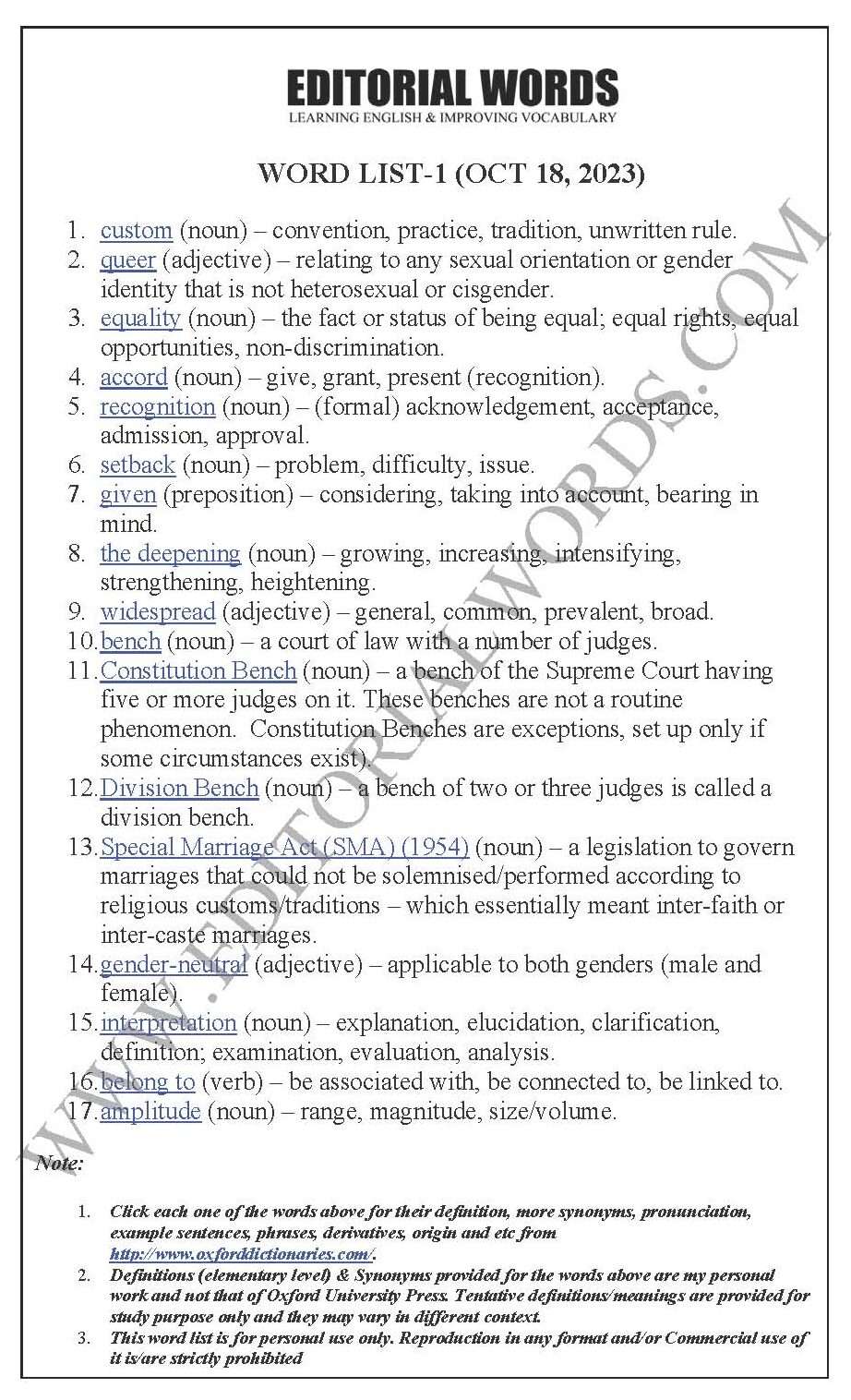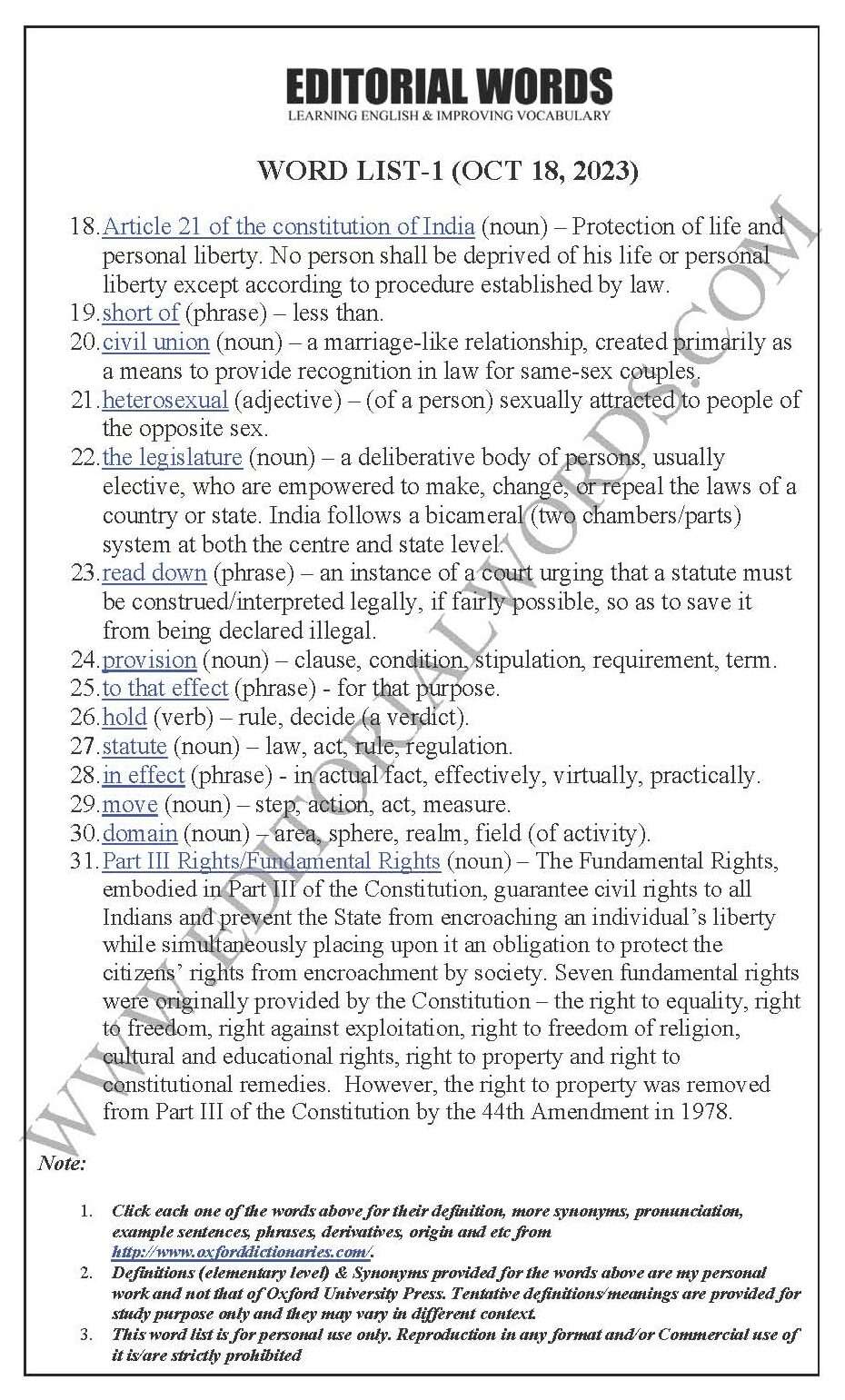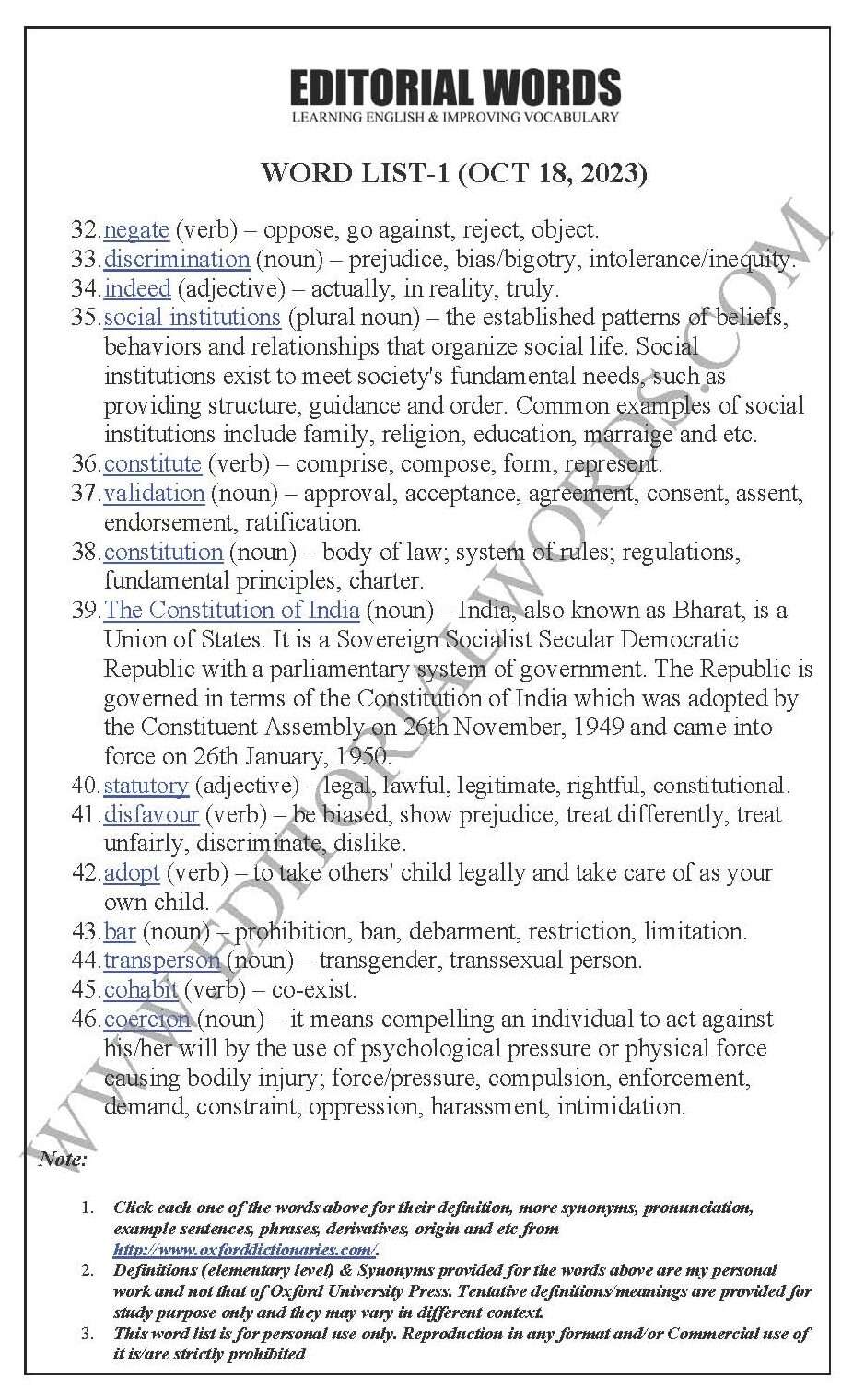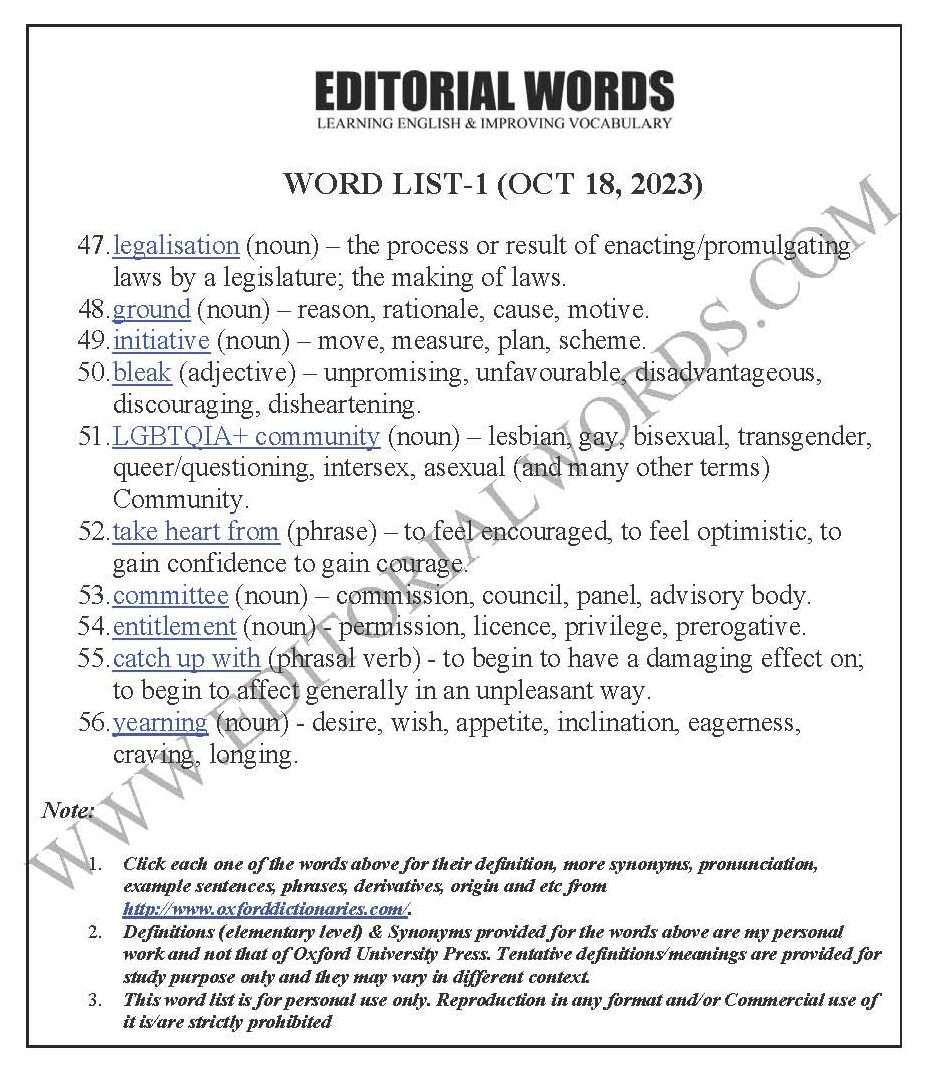The Hindu Editorial (Law and custom) – Oct 18, 2023
The Supreme Court of India’s refusal to accord legal recognition to marriages between persons of the same sex is a huge legal setback to the queer community in the country… For further reading, visit “The Hindu”. Below is today’s word list-1 for The Hindu Editorial (Law and custom) – Oct 18, 2023.
To read this article, click “The Hindu”.
This preview is provided here with permission.
Courtesy: The Hindu
The Hindu Editorial (Law and custom) – Oct 18, 2023:
- custom (noun) – convention, practice, tradition, unwritten rule.
- queer (adjective) – relating to any sexual orientation or gender identity that is not heterosexual or cisgender.
- equality (noun) – the fact or status of being equal; equal rights, equal opportunities, non-discrimination.
- accord (noun) – give, grant, present (recognition).
- recognition (noun) – (formal) acknowledgement, acceptance, admission, approval.
- setback (noun) – problem, difficulty, issue.
- given (preposition) – considering, taking into account, bearing in mind.
- the deepening (noun) – growing, increasing, intensifying, strengthening, heightening.
- widespread (adjective) – general, common, prevalent, broad.
- bench (noun) – a court of law with a number of judges.
- Constitution Bench (noun) – a bench of the Supreme Court having five or more judges on it. These benches are not a routine phenomenon. Constitution Benches are exceptions, set up only if some circumstances exist).
- Division Bench (noun) – a bench of two or three judges is called a division bench.
- Special Marriage Act (SMA) (1954) (noun) – a legislation to govern marriages that could not be solemnised/performed according to religious customs/traditions – which essentially meant inter-faith or inter-caste marriages.
- gender-neutral (adjective) – applicable to both genders (male and female).
- interpretation (noun) – explanation, elucidation, clarification, definition; examination, evaluation, analysis.
- belong to (verb) – be associated with, be connected to, be linked to.
- amplitude (noun) – range, magnitude, size/volume.
- Article 21 of the constitution of India (noun) – Protection of life and personal liberty. No person shall be deprived of his life or personal liberty except according to procedure established by law.
- short of (phrase) – less than.
- civil union (noun) – a marriage-like relationship, created primarily as a means to provide recognition in law for same-sex couples.
- heterosexual (adjective) – (of a person) sexually attracted to people of the opposite sex.
- the legislature (noun) – a deliberative body of persons, usually elective, who are empowered to make, change, or repeal the laws of a country or state. India follows a bicameral (two chambers/parts) system at both the centre and state level.
- read down (phrase) – an instance of a court urging that a statute must be construed/interpreted legally, if fairly possible, so as to save it from being declared illegal.
- provision (noun) – clause, condition, stipulation, requirement, term.
- to that effect (phrase) – for that purpose.
- hold (verb) – rule, decide (a verdict).
- statute (noun) – law, act, rule, regulation.
- in effect (phrase) – in actual fact, effectively, virtually, practically.
- move (noun) – step, action, act, measure.
- domain (noun) – area, sphere, realm, field (of activity).
- Part III Rights/Fundamental Rights (noun) – The Fundamental Rights, embodied in Part III of the Constitution, guarantee civil rights to all Indians and prevent the State from encroaching an individual’s liberty while simultaneously placing upon it an obligation to protect the citizens’ rights from encroachment by society. Seven fundamental rights were originally provided by the Constitution – the right to equality, right to freedom, right against exploitation, right to freedom of religion, cultural and educational rights, right to property and right to constitutional remedies. However, the right to property was removed from Part III of the Constitution by the 44th Amendment in 1978.
- negate (verb) – oppose, go against, reject, object.
- discrimination (noun) – prejudice, bias/bigotry, intolerance/inequity.
- indeed (adjective) – actually, in reality, truly.
- social institutions (plural noun) – the established patterns of beliefs, behaviors and relationships that organize social life. Social institutions exist to meet society’s fundamental needs, such as providing structure, guidance and order. Common examples of social institutions include family, religion, education, marraige and etc.
- constitute (verb) – comprise, compose, form, represent.
- validation (noun) – approval, acceptance, agreement, consent, assent, endorsement, ratification.
- constitution (noun) – body of law; system of rules; regulations, fundamental principles, charter.
- The Constitution of India (noun) – India, also known as Bharat, is a Union of States. It is a Sovereign Socialist Secular Democratic Republic with a parliamentary system of government. The Republic is governed in terms of the Constitution of India which was adopted by the Constituent Assembly on 26th November, 1949 and came into force on 26th January, 1950.
- statutory (adjective) – legal, lawful, legitimate, rightful, constitutional.
- disfavour (verb) – be biased, show prejudice, treat differently, treat unfairly, discriminate, dislike.
- adopt (verb) – to take others’ child legally and take care of as your own child.
- bar (noun) – prohibition, ban, debarment, restriction, limitation.
- transperson (noun) – transgender, transsexual person.
- cohabit (verb) – co-exist.
- coercion (noun) – it means compelling an individual to act against his/her will by the use of psychological pressure or physical force causing bodily injury; force/pressure, compulsion, enforcement, demand, constraint, oppression, harassment, intimidation.
- legalisation (noun) – the process or result of enacting/promulgating laws by a legislature; the making of laws.
- ground (noun) – reason, rationale, cause, motive.
- initiative (noun) – move, measure, plan, scheme.
- bleak (adjective) – unpromising, unfavourable, disadvantageous, discouraging, disheartening.
- LGBTQIA+ community (noun) – lesbian, gay, bisexual, transgender, queer/questioning, intersex, asexual (and many other terms) Community.
- take heart from (phrase) – to feel encouraged, to feel optimistic, to gain confidence to gain courage.
- committee (noun) – commission, council, panel, advisory body.
- entitlement (noun) – permission, licence, privilege, prerogative.
- catch up with (phrasal verb) – to begin to have a damaging effect on; to begin to affect generally in an unpleasant way.
- yearning (noun) – desire, wish, appetite, inclination, eagerness, craving, longing.
Note :
1. Click each one of the words above for their definition, more synonyms, pronunciation, example sentences, phrases, derivatives, origin and etc. from http://www.oxforddictionaries.com/.
2. Definitions (elementary level) & Synonyms provided for the words above are my personal work and not that of Oxford University Press. Tentative definitions/meanings are provided for study purposes only and they may vary in a different context.
3. This word list is for personal use only. Reproduction in any format and/or Commercial use of it is/are strictly prohibited.
The Hindu Editorial (Law and custom) – Oct 18, 2023:




“Phrasal Verbs” We Learnt Last Week
“Idioms & Phrases” We Learnt Last Week
“Important Definitions” We Learnt Last Week
Recent Word Lists For The Hindu Editorial Articles

Be the first to comment